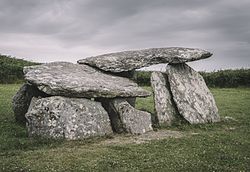Altar Wedge Tomb is a wedge-shaped gallery grave and national monument located outside the village of Schull, in County Cork, Ireland.[2]
| Altar Wedge Tomb | |
|---|---|
| Native name Tuama Dingeach na hAltóra (Irish) | |
| Altar Cromlech | |
 | |
| Type | wedge-shaped gallery grave |
| Location | Altar, Schull, County Cork, Ireland |
| Coordinates | 51°30′50″N 9°38′39″W / 51.513756°N 9.644037°W |
| Built | c. 2500 BC |
| Official name | Altar |
| Reference no. | 645[1] |
Location
editAltar Wedge Tomb is located 6.7 km (4.2 mi) WSW of Schull, on a cliffedge near Toormore Bay.[3]
History
editWedge tombs of this kind were built in Ireland in the late Neolithic and early Bronze Age, c. 2500–2000 BC.[4]
Cremated burials took place in 2000 BC and pit burials c. 1200 BC. Around AD 200 a pit was dug and filled in with fish, shellfish and cetacean bones, presumably as a ritual practice.[5]
Despite the name, there is no evidence that the "altar" was ever used for sacrifice. It was used as a Mass rock in the 18th century AD.[6] A holy well stood across the road.[citation needed]
It was excavated in summer 1989 by Dr. William O'Brien and Madeline Duggan. Material found included cremated human adult bones, a tooth, worked flint, charcoal, periwinkles, fish bones and limpets.[7]
Description
editThe entrance was aligned ENE–WSW, possibly with Mizen Peak (Carn Uí Néit) and maybe to catch the setting sun at Samhain (1 November).[8]
The tomb consists of a trapezoidal orthostatic gallery 3.42 m (11.2 ft) long, 1.9 m (6 ft 3 in) wide at the west end 1.25 m (4 ft 1 in) at the east.[citation needed]
A roof-stone 2.7 m (8 ft 10 in) long, is still above the east end, and a second rests against the westerly stones at either side of the gallery. There is no cairn material or evidence of kerbstones; they may have been removed for road construction in the 19th century AD.[7][9]
References
edit- ^ "National Monuments of County Cork in State Care" (PDF). heritageireland.ie. National Monument Service. p. 1. Retrieved 2 July 2020.
- ^ (Ireland), Ordnance Survey; Valera, Ruaidhrí De; Nualláin, Seán Ó (1 January 1982). "Survey of the Megalithic Tombs of Ireland: Counties: Cork, Kerry, Limerick, Tipperary". Stationery Office – via Google Books.
- ^ Wilson, Mike. "Altar Wedge Tomb ~ mega-what.com Ancient Sacred Places".
- ^ Mathieu, James R. (1 January 2004). Exploring the role of analytical scale in archaeological interpretation. Archaeopress. ISBN 9781841716190 – via Google Books.
- ^ Jones, Carleton Shepherd (1 January 2007). Temples of Stone: Exploring the Megalithic Tombs of Ireland. Collins Press. ISBN 9781905172054 – via Google Books.
- ^ "Altar Wedge Tomb and Mass Rock – Voices from the Dawn".
- ^ a b "842 « Excavations".
- ^ Scarre, Chris (8 July 2005). Monuments and Landscape in Atlantic Europe: Perception and Society During the Neolithic and Early Bronze Age. Routledge. ISBN 9781134482207 – via Google Books.
- ^ Schorr, Frank. "Altar Wedge Tomb".
